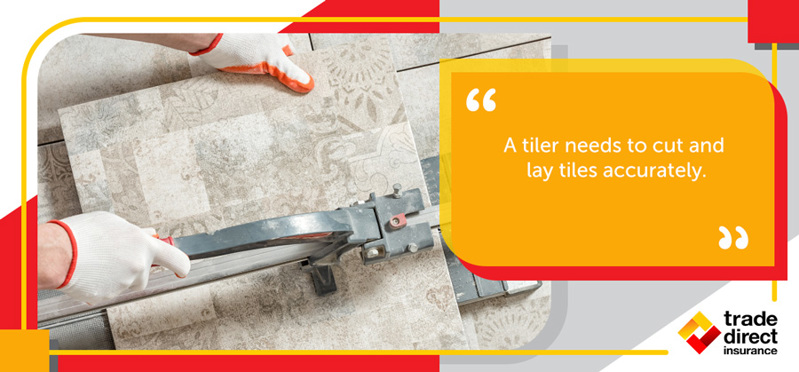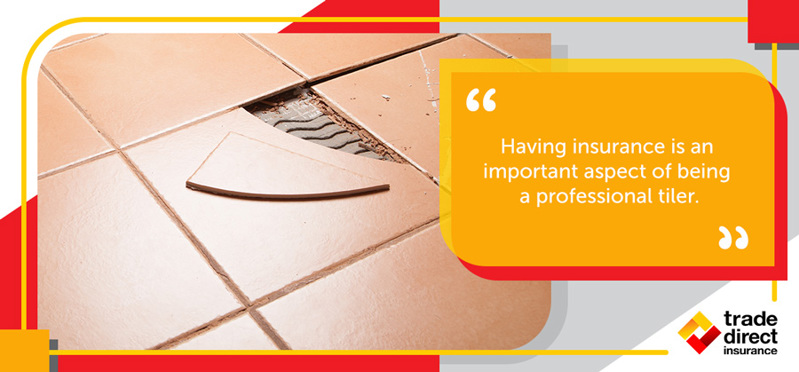
What does a Tiler do?
04 December 2023If you are looking at getting into a trade, working as a tiler can be a good option. Always in demand, the work of a tiler is varied and practical, as well as being reasonably well paid. So how do you get started in the business?
The work of a tiler
Tiling is a skilled profession which involves installing tiles into the floors and walls of a range of domestic and commercial spaces, e.g. in kitchens, bathrooms, hotels, restaurants, etc. A distinction tends to be made from roof tiling, which is its own trade.
The tiles need to be cut and installed, so a tiler must be able to:
- measure areas and tiles
- use various tools and equipment (e.g. tile scribes, wet saws and handheld tile cutters)
- apply mortar and adhesive
- lay tiles accurately.
Depending on the project, existing tiles may need to be removed and the area cleaned and prepared for the new tiles.

What experience or training does a tiler need?
You don’t need formal qualifications to become a tiler. However, you do need to be able to do the job. That means learning how to tile.
There are various ways you can do this, e.g:
- taking a course
- doing an apprenticeship
- learning on the job.
Tiler courses
There are courses available which teach tiling and offer a qualification. While not required, a qualification can reassure prospective clients about your skill and experience.
If you want to work on a building site, you may be required to have an NVQ qualification, so it can be a good idea to get one. You will normally need certain GCSEs or Level 2 qualifications to start on a course.
Apprenticeships
As an apprentice, you will have a paid job while learning the skills to become an experienced and qualified tiler. There is a range of apprenticeships available which offer different qualifications. GCSEs or an equivalent Level 2 qualification are typically a prerequisite.
Becoming a tiler’s mate
You can sometimes get a job working as an assistant for a tiler. This provides an income and experience, but no qualifications.

What other skills are required?
measuring areas accurately so you know how many tiles to order
cutting tiles to fit
preparing an area for tiling, e.g. cleaning, repairing and levelling
cutting, shaping, and polishing tiles
mixing cement and applying adhesives
Physically, you need to be in good health, i.e. fairly strong and fit. You will be lifting packs of tiles, standing or kneeling in one place for periods of time, and clearing up any mess.
Apart from the practical requirements, you need to deal with the business side. That means:
- talking to clients
- quoting on jobs
- placing orders
- invoicing
- registering for tax
- submitting appropriate tax returns.
Setting up your tiler business
You can work as a tiler either on a self-employed basis as a sole trader, or by setting up as a limited company or partnership. You will need to decide what the best option is and comply with any laws or regulations. You will also need to register with HMRC for taxation.
You should also consider joining a professional body or tiler’s association. This can give you extra credibility.
The next step is to consider how you are going to attract clients. You may simply decide to rely on word of mouth and referrals. For this, you could also have flyers and business cards printed so people have your details.
Alternatively, or in addition, you may decide to join a trade directory or have a social media profile for your business on platforms like LinkedIn, Facebook, or Instagram.
You could also set up your own website. This can be done affordably, and doesn’t need knowledge of coding to get off the ground. It will be worth having a look around the web to see what other tilers have done in this regard.

Insurance for tilers
One of the most important things you need to think about is tiling insurance.
As a minimum, you should consider public liability insurance to protect you against third-party claims for damage and injury. Third party financial loss cover could also be a smart investment, to protect you if something you do results in a financial loss for the client.
If you employ anyone or have your own trainee you will also need employers’ liability insurance.
You should think about tools insurance in case they get lost, damaged, or stolen. Professional indemnity insurance can also be a useful safeguard if you provide any professional advice in your work. If the advice turns out to be wrong and causes a loss, it’s designed to protect you.
Finding the right insurer for tiling
Trade Direct Insurance specialises in insurance for the construction industry, including tilers. Our broad selection of insurances for tradesmen covers the wide range of risks you can expect, as well as those specific to you as a business or contractor.
For more information, or to get a quote, get in touch with Trade Direct Insurance today. You can contact us by sending an email to enquiries@tradedirectinsurance.co.uk or calling 01483 521650.
Trade Direct is authorised and regulated by the Financial Conduct Authority. The company is a leading UK independent broker providing a wide range of policies to tradesmen and construction workers.
This note is not intended to give legal or financial advice, and, accordingly, it should not be relied upon for such or regarded as a comprehensive statement of the law and/or market practice in this area. In preparing this note we have relied on information sourced from third parties and we make no claims as to the completeness or accuracy of the information contained herein. You should not act upon information in this bulletin nor determine not to act, without first seeking specific legal and/or specialist advice. We and our officers, employees or agents shall not be responsible for any loss whatsoever arising from the recipient’s reliance upon any information we provide herein and exclude liability for the content to fullest extent permitted by law.
